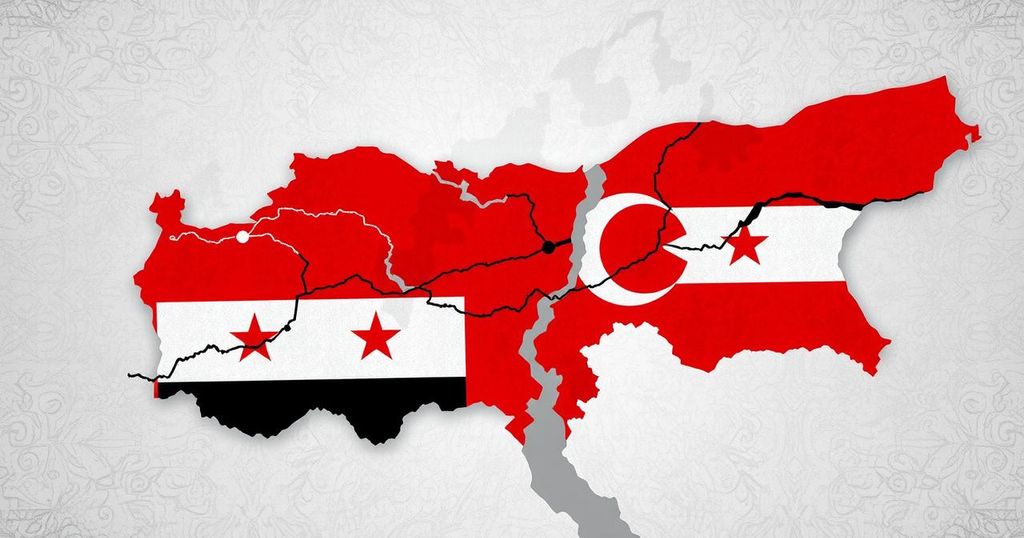Turkey’s Dilemma: Navigating the Complexities of Syria Policy

Turkey’s Syria strategy faces significant hurdles from military stalemates, Russian opposition, and US pressures, leading Ankara to explore political solutions to reshape its Kurdish policy. Efforts to engage with Syrian President Assad indicate a shift in strategy aimed at resolving security issues. However, Turkey’s concerns over a US-backed Kurdish state and potential regional conflicts add complexity to its situation.
Turkey’s strategy regarding Syria is currently encountering significant challenges, marked by military stalemates, resistance from Russia, and pressures from the United States. In an attempt to address its concerns, Turkey is contemplating political negotiations that may alter its approach towards the Kurdish population. Specifically, Turkey’s focus is on countering the influence of the PKK-affiliated YPG, which has been backed by the SDF and the US in the region.
Turkey’s military operations from 2016 to 2019 aimed to secure its borders from YPG forces; however, complications arose following military agreements between the SDF and Damascus, facilitated by Russia. These developments enabled Moscow to reinforce the region with military assets, effectively blocking Turkey’s attempts at further incursions. The United States has consistently opposed Turkish operations against the SDF, thereby complicating Ankara’s strategic options amidst fears of economic sanctions which could exacerbate Turkey’s already fragile economy.
In 2023, Turkish President Recep Tayyip Erdogan engaged in discussions with Russian President Vladimir Putin and subsequently expressed a willingness to negotiate with Syrian President Bashar al-Assad to address mutual security concerns. This pivot indicates a recognition that direct engagement with Damascus might be essential for Turkey to stabilize its southern borders and mitigate threats from Kurdish factions. Nevertheless, any collaboration remains uncertain given Assad’s differing policy goals.
Turkey also possesses profound apprehensions regarding a US-backed Kurdish entity emerging along its border, raising fears of increased separatist movements within Turkey. Additionally, potential conflicts involving Israel and Iran further amplify Turkey’s security dilemmas, particularly with the threat of refugee influxes from Syria exacerbating Turkey’s humanitarian challenges.
A new dimension to Turkey’s approach was introduced when Devlet Bahceli, leader of the Nationalist Movement Party, proposed allowing Abdullah Ocalan to address the Turkish parliament, contingent upon a cessation of the PKK’s militant activities. However, this overture lacks substantial support within Erdogan’s administration, raising doubts about its feasibility and the potential for reviving a previous peace process that had ultimately collapsed.
Despite these complexities, there exists a strategic opportunity for the United States and Turkey to collaboratively seek resolutions in Syria, provided that the US remains neutral regarding Turkey’s engagements with Kurdish groups. This collaboration could help alleviate regional tensions and recalibrate the geopolitical landscape. Ultimately, the persistence of uncertainties and challenges necessitates careful navigation of the evolving dynamics between Turkey, Syria, and broader international actors.
Turkey’s involvement in Syria is rooted in its efforts to combat Kurdish militant groups, primarily the PKK and its Syrian affiliate, YPG. Since 2015, Turkey has focused on establishing security along its borders to counter perceived threats from these groups. The entanglement of its military operations with regional dynamics, particularly the influence of Russia and the United States, has intensified Turkey’s quest for a strategic resolution. The intricate relationship between Turkey, the SDF, and the Assad regime further complicates the situation as Turkey seeks to recalibrate its foreign policy in light of evolving local and global pressures.
In conclusion, Turkey is at a crossroads regarding its strategy in Syria, weighing military and political options amidst external pressures and internal challenges. A potential dialogue with Damascus highlights a shift in strategy that aims to address Turkey’s primary security concerns; however, the likelihood of achieving a sustainable resolution remains uncertain. Furthermore, the interplay between regional actors and the need for US cooperation introduces a complex layer to Turkey’s ongoing efforts to navigate this multifaceted crisis.
Original Source: www.atlanticcouncil.org






